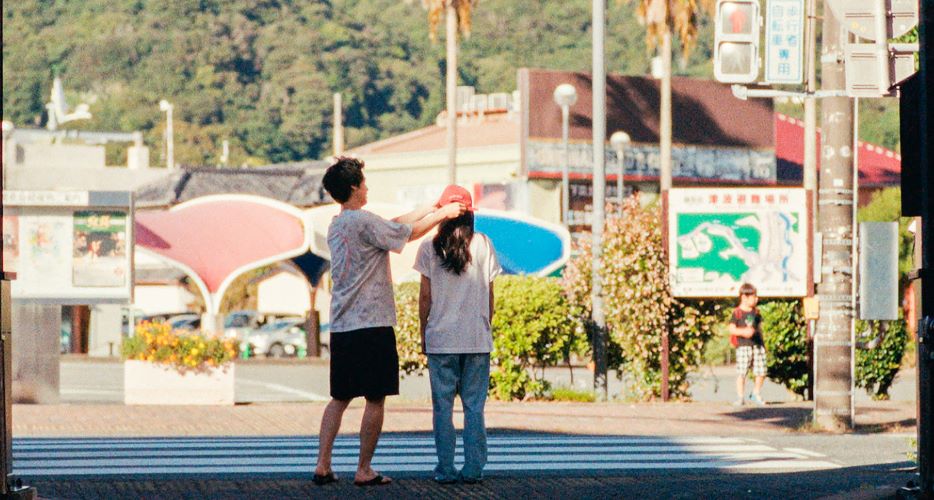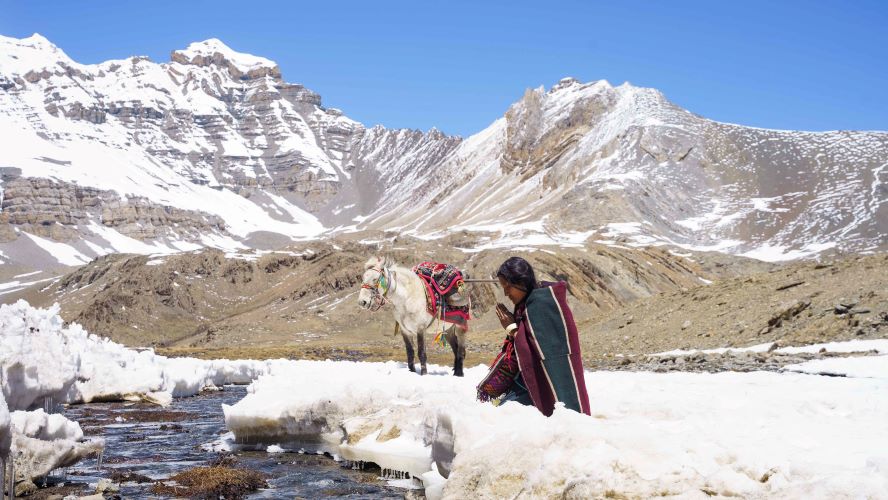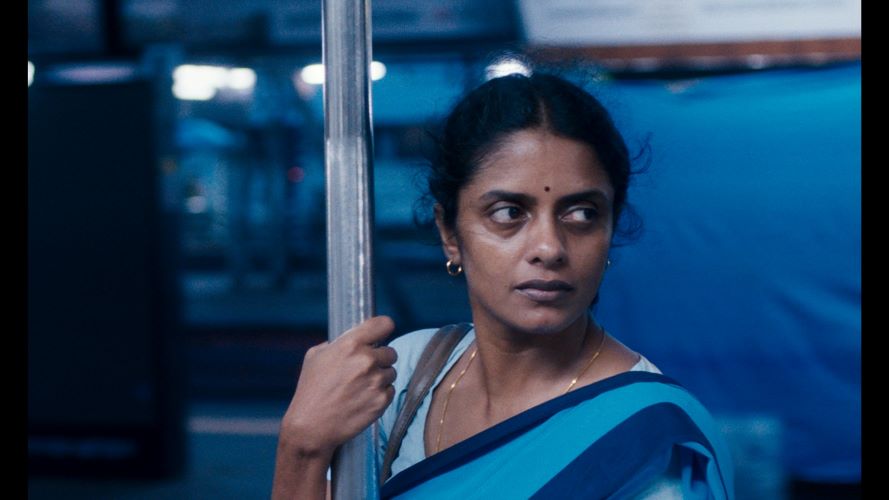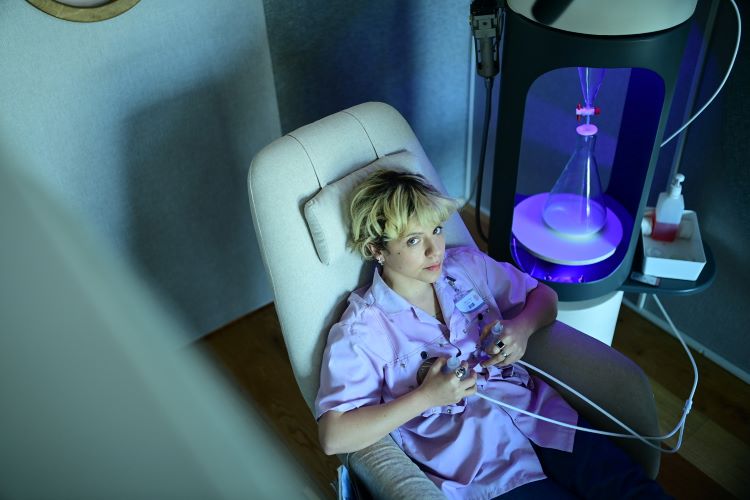The 13th edition of the Arava International Film Festival will take place from November 14 – 23, 2024. I’ve had the opportunity to preview several films from the program:

Super Happy Forever, the latest film from director Kohei Igarashi, tells a tale of love in a unique way that is a commentary on our relationship to time, and happiness. The film opens as Sano (Hiroki Sano) and his friend Miyata (Yoshinori Miyata) visit a Japanese beach resort, yet the mood is sombre – a sharp contrast with the film’s title. Even the sea looks gray. Sano’s demeanour and movements are heavy and slow. Walking along the beach, Sano approaches a family and asks them if the red cap their boy is wearing belongs to the boy. Later, back at the hotel he asks if anyone has found a red cap, explaining that he lost it five years ago. The red cap is not found, but Sano is informed that the hotel will close at the end of the month. Sano is deep in grief and loss, and his friend Miyata tries to help him, saying “there’s not just one reality.” It is this perspective on life, love, time, and reality that the film conveys, and does so in an imaginative and vivid way.
The film follows Sano, his friend Miyata – who has just completed a seminar titled ‘Super Happy Forever’ – Sano’s wife Nagi (Nairu Yamamoto), and the Vietnamese maid Anh (Hoang Nhu Quynh); each of whom will have a role in this narrative, which inverts chronological order, folding the past into the present, with the recurring refrain of Bobby Darin’s 1959 version of Beyond the Sea. Super Happy Forever opened the Venice Days program at the Venice International Film Festival. Igarashi’s 2017 film The Night I Swam was screened at the Arava Festival seven years ago.

Min Bahadur Bham’s Shambhala takes the viewer on a journey through the majestic, stark beauty of the Himalayas, through the quest of its protagonist Pema, a journey that is at once both physical and spiritual. One first encounters Pema (Thinley Lhamo) as she is about to marry her beloved Tashi (Tenzin Dalha) and his two younger brothers, Karma (Sonam Topden), who is a monk, and Dawa (Karma Wangyal Gurung) who is still a child. Pema’s marriage to Karma and Dawa is effectively nominal, she is more like a sister to Karma, and her relationship to young Dawa is maternal. Polyandry is practiced in the mountains of Nepal, influenced by the scarcity of land. If all the men in the family marry one woman, the first-born son inherits, and the family land remains undivided. At two and a half hours, the film is a leisurely immersion in Nepali culture, and a deepening acquaintance with Pema, as the blushing bride emerges as a woman of strength and conviction.
When Tashi leaves on a month-long journey, Pema is left to care for the mischievous Dawa. Taking her responsibilities seriously, she meets with Dawa’s teacher, and the two share mutually pleasurable conversations. Yet when it appears that Pema is pregnant, the rumours begin to fly, and Pema is determined to seek out Tashi – who has not returned from his trading trip and protect her good name and relationship. Infused with humor, as well as the beauty and peril of the land, Shambhala is also a commentary on the status of women in the local mountain culture.

Winner of the Grand Prix at the 2024 Cannes Film Festival, All We Imagine as Light, written and directed by Payal Kapadia tells the story of two very different women against the backdrop of life in Mumbai. Prabha (Kani Kusruti) is an experienced nurse dedicated to her job, yet devoid of a personal life. Although she is very caring towards her patients, and sincerely helpful to her fellow nurses, she does not seek out fun or friendship, keeping her distance from others. This is due in part to her difficult personal status – following an arranged marriage, her husband left India to work in Germany, and she has not had any contact with him for over a year.
Anu (Divya Prabha) is young and full of life and seems to see her job as an unavoidable intrusion between clandestine meetings with her Muslim boyfriend Shiaz (Hridhu Haroon). Where Prabha follows tradition at the cost of repressing her feelings, hopes, and dreams, Anu, albeit secretly, defies the strict traditions of her family, and although her future is uncertain, is eager to experience the pleasure of the present moment.
Kusruti embodies Prabha with a visage of secret sorrow, and a stiff demeanor that conceals a tender heart. When their fellow nurse Parvaty (Chhaya Kadam) moves back to her village, Prabha and Anu help her on the journey, and the move away from the crowds and noise of the city gives each of them the space to consider her life and choices. Poetic in its rhythms and images, it’s a beautiful film.
Louise Courvoisier’s debut feature film Holy Cow is one of the relatively rare feel-good festival films. Totone (Clément Faveau) leads a carefree life, hanging out with his friends, drinking, and occasionally hooking up. His father’s death leaves him in charge of his 5-year-old sister Claire (Luna Garret) and Totone sort of steps up but is essentially an impulsive kid at heart. His attempts to take on a steady job and get his sister to school on time are filled with missteps, and when he overcomes his general genial tendency to aimlessness to take on a goal, it’s a lot closer to a daydream than a realistic aim. Totone goes for it with all his youthful energy, few moral qualms, and a lot of help from his friends. Claire is a lot more tolerant, helpful and mature than once would expect from such a young child, but that is perhaps the result of growing up alongside Totone. It’s fun to follow their lively adventures.

Milk stars singer-songwriter Hila Ruach, who is very appealing and relatable as Tala, a struggling musician who has just had a baby and is trying to figure out motherhood while earning a living selling her breast milk. Winner of the Ophir Award for Best Screenplay, written and directed by Maya Kenig, the film depicts a dystopian milk factory where new mothers in need of money sit in cubicles, attached to a breast pump, while looking at photos of their babies to encourage better flow. Quirky and full of humor, the film takes an honest look at the overwhelming aspects of motherhood, as Tala’s life is plunged into turmoil by the tiny creature (the baby is very cute) she has brought into the world.
It’s also very much about the economic divide, in which Tala and her fellow factory workers pump breast milk for the babies of the rich, while their own babies end up drinking formula. Tala’s encounter with Nili (Hadas Yaron) delineates this divide, as a complex relationship develops that is mutually beneficial and even affectionate, yet always marked by an imbalance of power. Lots of fun and thought-provoking.
Information on accommodations and tickets will be available on the Arava Festival website: www.aravaff.co.il/en/
The Arava International Film Festival is the initiative of producer Eyal Shiray in cooperation with the Central Arava Regional Council. The festival is supported by the Central Arava Regional Council, The Ministry of Culture and Sport Film Council, Mifal HaPais, The Office for the Development of the Negev and Galilee, and the Ministry of Regional Cooperation. The festival is produced and directed by Eyal and Tinker Shiray.





